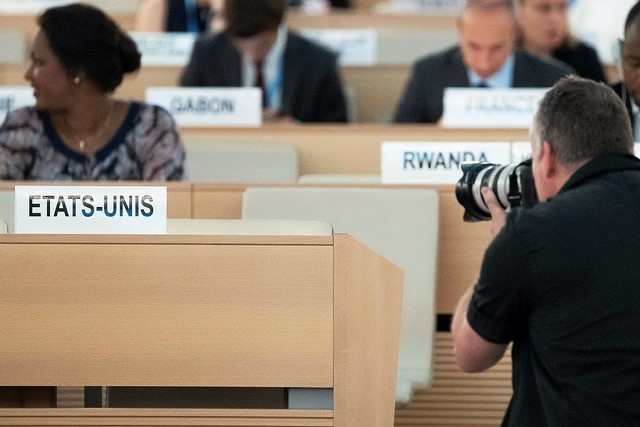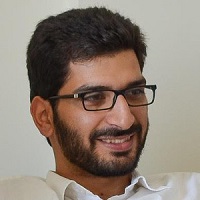Christians are called to “open our mouth for the mute, for the rights of all who are destitute”, says Wissam al-Saliby, the WEA Advocacy Officer for Human Rights in Geneva.
 A photographer tak a photo of the plate of the United States of America at the 38th Regular Session of the Human Rights Council. 20 June 2018. / UN Photo, Jean-Marc Ferré (Flickr, CC)
A photographer tak a photo of the plate of the United States of America at the 38th Regular Session of the Human Rights Council. 20 June 2018. / UN Photo, Jean-Marc Ferré (Flickr, CC)
After withdrawing from the Paris climate agreement and the UNESCO, the United States are leaving the United Nations Human Rights Council as well.
US President Trump’s UN ambassador, Nikki Haley, argued last week that the UN Human Rights Council needed to be reformed because “with members like China, Cuba, the Democratic Republic of Congo, and Venezuela the Human Rights Council is not worth its name”.
The decision to pull out of this global Human Rights forum was announced the same week the US administration came under severe criticism (including from evangelicals) because of the application of a “zero tolerance” migration policy that caused hundreds of families to be separated. Donal Trump later revoked these measures with a new immigration order.
WISSAM AL-SALIBY: “I REGRET THE DEPARTURE OF THE US”
Is the decision of leaving the Human Rights Council of the United Nations right? What is a Christian approach to this situation?
 The Lebaneses Wissam al-Saliby is the World Evangelical Alliance Advocacy Officer to the United Nations Human Rights institutions in Geneva (Switzerland).
The Lebaneses Wissam al-Saliby is the World Evangelical Alliance Advocacy Officer to the United Nations Human Rights institutions in Geneva (Switzerland).Evangelical Focus asked Wissam al-Saliby, the World Evangelical Alliance Advocacy Officer at the United Nations Human Rights institutions in Geneva (Switzerland).
“I regret the departure of the United States from the United Nations Human Rights Council”, al-Saliby said.
The WEA representative admits that “we live in an imperfect world”, and “the Human Rights Council is a reflection of this imperfect world”.
“Working at the council reminds me that we are living between regeneration, the redemption of our bodies and the recreation of the cosmos. This is a world that is hurting. Creation is groaning. The weight of sin is heavy”.
“OPENING THE MOUTH FOR THE MUTE”
The evangelical Christian advocate for Human Rights believes Christians should look at the Bible to find what they are called to do. “As Christians, what is our calling? In Luke 10:29, Jesus calls us to be neighbors to those who need us. In Matthew 5:9, Jesus calls us to be peacemakers. The Old Testament and the New Testament call us to seek justice and to love mercy”, al-Saliby explains.
“Despite the flaws of the Human Rights Council (as is the case of all inter-governmental bodies), it is a unique venue where we can seek justice, and love mercy. As per Proverbs 31, verses 8 and 9, it is a venue where we open our mouth for the mute, for the rights of all who are destitute, and defend the rights of the poor and needy”.
Al-Saliby told Evangelical Focus the World Evangelical Alliance would continue to work for these values in the UN institutions. “The WEA's office in Geneva will pursue its engagement with the Human Rights Council, relaying the voice of national evangelical alliances that are member of the WEA to the UN institutions”.
“As Human Rights are eroded globally and knowing that 80% of the world’s population live in countries where freedom of religion is restricted, the council is an irreplaceable venue to defend human rights including freedom of religion”, he concluded.

Las opiniones vertidas por nuestros colaboradores se realizan a nivel personal, pudiendo coincidir o no con la postura de la dirección de Protestante Digital.
Si quieres comentar o